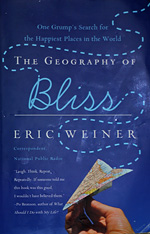Book Review: The Geography of Bliss by Eric Weiner

Title: The Geography of Bliss
Author: Eric Weiner
Publishers: Twelve Books
Pages: 325
Eric Weiner sets out on a world tour on a quest to find out what makes people happy. He journeys to countries where people are peaceful, happy, rich, poor and even unhappy, to find reasons for their happiness or the lack of it.
In the first chapter or two, ‘Geography of Bliss’ appears set to be a landmark book in travel writing that stands along with Theroux’s Great Railway Bazaar or John Krakauer’s ‘Into thin Air.’ It comes across as a completely new approach to travel writing. Weiner seems to be after something really important and out to reveal a truth that can keep humans happy forever in future. But he looses track quickly as he tries to mix a journalistic research and scientific discoveries with personal experiences, and doesn’t steer the book in any particular direction. It has elements of Theraux’s mindless interactions with people encountered on the way; it has a typical journalist’s way of working using interviews supported with some data to come to some conclusion. None of these finally strike a chord with the reader, but the flow of the book and Weiner’s engaging humour takes you till the last page without much effort.
Weiner begins his journey with some scientific data. At a happiness research center in Netherlands, he goes through tonnes of data that gives an idea of most and least happy countries. He goes through some insights that reveal some obvious truths (winning a lotter makes a person happy) and some not so obvious (but the lottery winners quickly return to their earlier state of mind). The research center also helps him choose the countries to visit – Switzerland and Iceland – the countries that consistently stayed on the top of happiness charts and Moldova – the least happy country – a former Soviet territory sandwiched between Romania and Ukraine.
He spends time in these countries speaking to expats, talking to a few locals and searching for a national attitude (or conditions) to find reasons for people’s happiness levels. The book comes dangerously close to being a dry reportage of a journalist, but is saved by Weiner’s continuous infusion of humour in nearly every incident, conversation and observation. It also comes close to Theroux’s style of writing in Railway Bazaar where people and interactions take center stage and leaves everything else behind, including Weiner’s search. But his humour too becomes overdone and appears deliberately forced at occasions.
Weiner’s interactions with people and his humour helps the reader stay with the book and go along with him in the journey, though it becomes quickly obvious that he is not about to unveil any secrets to happiness. But at the end of the journey he reaffirms time-tested wisdom that your social interactions, quality of living, faith, trust, all have their contribution to happiness. He discovers that money is essential but is not the biggest contributor to happiness. But his discoveries and the strength of the topic aside, the book scores in the narration that finally keeps you turning pages.